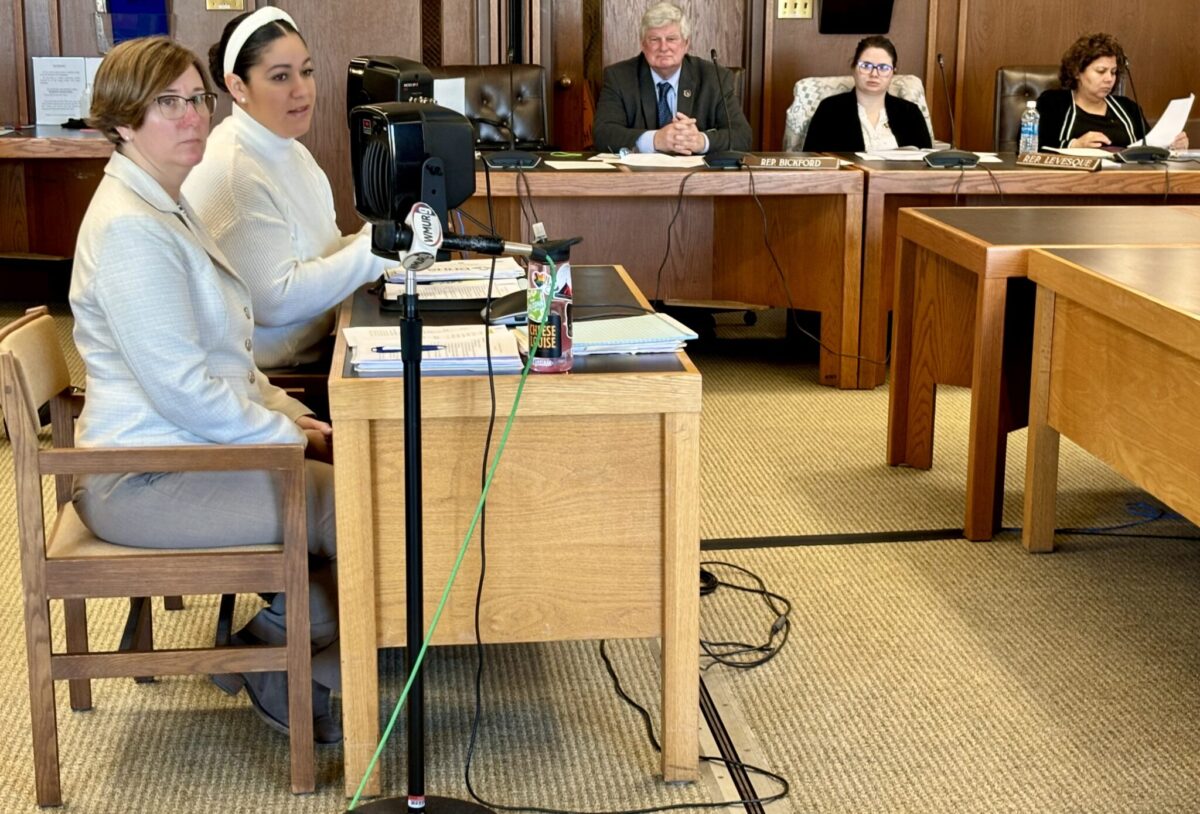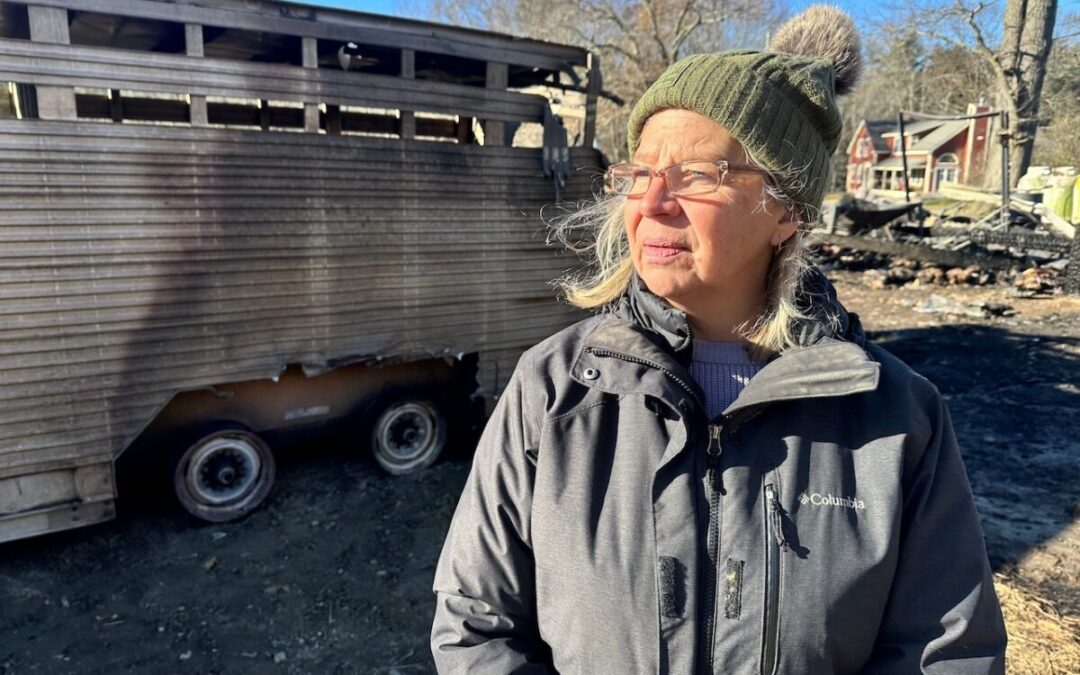
Child Advocate Cassandra Sanchez (second from left) and Associate Director Lissa Mascio (left) testify before House lawmakers on Feb. 6, 2024. (File photo by Annmarie Timmins/New Hampshire Bulletin)
Cassandra Sanchez, New Hampshire’s child advocate, saw her team shrink nearly by half this month.
When New Hampshire’s state budget went into effect July 1, so too did a major cut to the Office of the Child Advocate. Established in 2018, the agency serves as a youth-focused watchdog for the state, overseeing its child welfare, juvenile justice, and youth care systems, and advocating for children’s interests. Over the past few months, the office was the target of state lawmakers looking for cost savings amid a difficult fiscal year.
“This month of July started with a lot of angst and unknown,” Sanchez said.
The office was first placed on the chopping block in March as Republican lawmakers were working to trim hundreds of millions of dollars from the budget. State Rep. Dan McGuire, an Epsom Republican and chair of one of the three legislative subcommittees working through the state budget, said at the time that it, and a few other small state offices, “are sort of nice-to-haves, but they’re not necessary, and so we need the money.” The House subsequently passed a budget that eliminated the office entirely.
When the budget went to the Senate, Gov. Kelly Ayotte urged senators to restore the office. Senate President Sharon Carson, a Londonderry Republican, spearheaded an effort to save the office but downsize it. Carson told the Bulletin in May she understood the importance of the work the office does, but was “trying to find a middle ground that the House will accept.” Carson’s proposal was the version that ultimately made it into the final budget and was enacted this month.
Thursday, the office laid off two employees, Sanchez said, adding that the state is trying to find jobs for them in other parts of the government. Two other employees quit in recent months because they knew their positions were set to be eliminated. They will not be replaced, and so the office of nine is now an office of five.
“So the last two weeks have been focusing heavily on, one, supporting the two employees that were going to be laid off,” Sanchez said. “And then, two, really focusing on prioritizing the work that we’re going to do in the office and starting to wrap our heads around the idea of letting certain things go because we don’t have the staff to achieve them.”
Top among Sanchez’s concerns with the smaller staff is that her office will be unable to review restraints and seclusions that occur at residential care facilities for children. State law allows staff at residential facilities to physically restrain children, particularly those with behavioral issues, or seclude them from their peers in an isolated room if they become a danger to themselves or others. Restraints and seclusions are supposed to be a last resort and temporary while the child calms down and regulates their emotions. One of the people laid off was responsible for reviewing incident reports filed by staff to ensure restraints and seclusions are handled properly and consistent with the law, she said.
“The research, what it tells us about restraints and seclusion is that it is not beneficial for children and is extremely traumatizing,” Sanchez said. “So as a state, we have been focusing for many years now on reducing the use of restraint and seclusion on children. It’s not only traumatizing for the children, it’s also traumatizing for the staff that are doing it, as well as other children who may be observing that restraint or seclusion. So we are reading every single one of those reports to ensure that the facilities are using them only when absolutely necessary, that they have tried other techniques to deescalate the situation and help regulate that child’s emotions in the moment, and we are ensuring that they are used very sparingly in very desperate need for short periods of time.”
For example, she said her team has worked to ensure that a particularly dangerous kind of restraint known as “prone restraint” — prone restraint has been associated with death and is illegal in New Hampshire — is never used. Sanchez said the office will no longer have the bandwidth to review the reports.
Sanchez said the office is also adjusting its goal response time. She said they previously strived to respond to reports to their office within 48 hours and have often been able to do so within 24. She doesn’t think that will be feasible anymore. She now plans on telling people they can expect a response to reports in three to five business days.
“If a child’s in a mental health crisis, three to five days is a really long period of time,” she said. “That can escalate to that child having to be in the highest end of our care, which is hospitalization.”
Sanchez said the office does tell people they are not an emergency service like police or EMS, and thus do not have an emergency-level response time. However, the weight of the calls they receive from families “in imminent crisis” often necessitates quick response, she said.
“So for us, that is a hard one to have to cope with,” she said. “Putting that message out there that that is going to be our new time frame.”
Sanchez anticipates the team will discover more areas where they have to pull back. She said the summertime, when children are home from school out of view of mandatory reporters, is typically less busy for the office and similar agencies like the Division for Children, Youth, and Families, but when children go back to school in the fall, she expects their caseload will increase.
Outside of cost concerns, some lawmakers who pushed to cut the Office of the Child Advocate were unhappy with the office’s advocacy work. The budget bill included a provision prohibiting the office from partisan advocacy. Sanchez had been vocal in support of trans youth and in April 2024, she participated in a press conference speaking out against bills targeting LGBTQ children. State Sen. Victoria Sullivan told New Hampshire Public Radio that advocacy is “distracting from the actual good work that’s happening with the children.” Other lawmakers expressed a similar sentiment.
Sanchez said she won’t be able to do any advocacy even if she wanted to. One of the positions cut was the office’s legislative liaison, who was responsible for a lot of that advocacy work, she said. Managerial and human resources tasks will also now fall to Sanchez because those duties had previously been handled by a position just eliminated, leaving her with less time for advocacy.
“I’m not going to have time to be following bills closely and to be advocating in the Legislature,” she said. “And that may have been their intent, and if it was, they achieved what they were getting at, because I don’t foresee how that’s going to be possible.”
With the downsizing, Sanchez also worries the state could experience a tragedy because her office is unable to respond properly. Outside of the resulting trauma for a family, any such incident could cost the state more money than it saved in cutting the office.
Indeed, the state saved roughly $500,000 over two years by shrinking the Office of the Child Advocate. Eliminating it outright would’ve saved about $2 million. The settlement for one abuse lawsuit can often cost the state millions. For example, a massive child abuse scandal at the Youth Development Center, a juvenile justice facility in Manchester, has so far cost the state over $150 million in settlements. The Office of the Child Advocate is aimed at preventing or intervening in these situations before it’s too late.
“My biggest concern for my office staff is burnout, because they are so invested in this work,” she said. “They’re so passionate about this work. Letting things go is very hard. And so I can see some folks in the office having a really hard time taking that step away from certain things.”
The whole ordeal has left Sanchez frustrated.
“There’s a lot of messages out there of, ‘Oh, the office was saved, that’s great, and we can continue on, and it didn’t have an impact,’” she said. “And it’s frustrating that there is a narrative that it didn’t have an impact, because it absolutely did have an impact. It had an impact on the people that we have available to do the work, which is going to have an impact on the work that we’re able to do and the effectiveness of the office.”

We asked, you answered: How do you feel about Trump’s attempt to dismantle the Department of Education?
A version of this story appeared in Granite Post's newsletter. Subscribe here. The Trump administration is moving closer to dismantling the US...

WMUR’s Spirit of Giving Food Drive invites community support Dec. 12–14
WMUR’s Spirit of Giving Food Drive runs from December 12-14. Here are all the details. WMUR’s official Spirit of Giving Food Drive takes place this...

Black Mountain Beats the Clock (and Bretton Woods) in Season-Opening
Black Mountain broke NH resort records by opening for the season on November 17. Here’s what you need to know. On November 17, Black Mountain became...

Cities with the most expensive homes in New Hampshire
Purchasing a home is one of the most important investments there is. More than a place to live, homeownership is an asset with the potential to...

Hurd Farm reels after fire destroys barn, turkeys days before Thanksgiving
A fire destroyed the Hurd Farm’s processing barn in Hampton early Tuesday, Nov. 18, killing 75 live turkeys and destroying several processed turkeys...

Is it legal in NH to have Christmas lights, decorations on your car during the holidays?
Starting on Nov. 27, you can drive through 3.5 million holiday lights at the New Hampshire Motor Speedway in Loudon. But this is about as close as...





